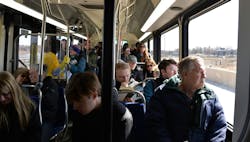Metropolitan Council adopts framework to make Metro Transit service more available
The Metropolitan Council has endorsed Network Now, a framework for making Metro Transit’s service more available for riders on busy corridors throughout the day, nights and weekends, as well as between suburban communities.
The Metropolitan Council’s endorsement of Network Now follows more than a year of engagement with riders, transit workers and local leaders. According to the Metropolitan Council, the framework will be implemented through quarterly service changes made over the coming years as resources allow. The council notes that fully implementing the improvements outlined in Network Now would expand transit service in the Twin Cities area by 40 percent compared to 2023 levels.
“The service improvements we are committing to in Network Now respond to changing travel behavior and rider feedback,” said Metro Transit General Manager Lesley Kandaras. “As we engaged with riders and community members, we heard strong support for expanding transit service and improving options. Network Now is grounded in what we’ve heard.”
Key changes in Network Now include:
- Expanded service on more than 70 routes, including more weekend service on 11 routes, late-night service on routes 10, 18, the Metro C and D lines and hourly midday service operating in both directions on express routes 250, 270, 673, 768, 850.
- Continued investment in the region’s Metro network, including extending the Metro Gold Line to Minneapolis and the planned Metro G Line from downtown Saint Paul to West Saint Paul.
- Trips every 30 minutes or better on most suburban local routes to provide more suburb-to-suburb transit options.
- Expanded door-to-door, on-demand microtransit service to eight additional suburban zones.
- The official discontinuation of 50 routes, nearly all of which provided weekday express service. All but two of these routes have been suspended since 2020.
Collectively, the Metropolitan Council notes the service changes are designed to grow ridership by responding to changes in when and where people are choosing to travel, including spreading service more evenly across the day seven days a week.
“When, where and how people want to get around has changed significantly in recent years,” said Metropolitan Council Member and Chair of the Metropolitan Council Transportation Committee Deb Barber. “Network Now not only responds to these changes, but shows our commitment to listening to and learning from everyone who has a stake in our region’s transit system.”
The council says the endorsement of Network Now follows the successful March 22 opening of the Metro Gold Line and as Metro Transit prepares to open two additional bus rapid transit (BRT) lines, the Metro B Line and Metro E Line, later this year.
According to the Metropolitan Council, after all of the BRT lines open, 38 percent of the region’s households with no vehicle access will be within a half-mile of a light rail or BRT station.
By the end of this year, Metro Transit plans to identify three additional corridors where BRT lines could open between 2030 and 2035; feedback on candidate corridors is being accepted now.
“Investing in fast, frequent and reliable transit not only helps people get where they need to go, but makes our entire region more prosperous, equitable and resilient,” said Metropolitan Council Chair Charlie Zelle. “Our service improvement framework points the way, and we look forward to advancing these improvements in partnership with community stakeholders across the region.”
